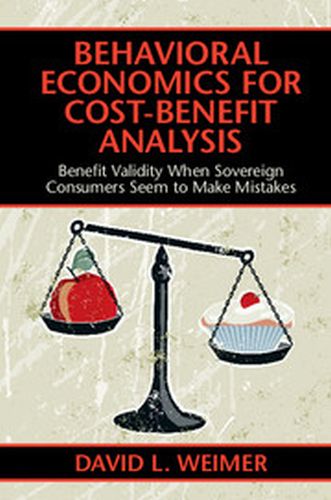BEHAVIORAL ECONOMICS FOR COSTBENEFIT ANALYSIS
L. Weimer David

Oprawa:
MIĘKKA
Wydawca:
Cambridge University Press
ISBN:
9781316647660
Opis produktu
David L. Weimer is the Edwin E. Witte Professor of Political Economy at the University of Wisconsin Madison. He is the author of numerous articles and monographs on health policy and policy craft as well as the coauthor of two texts that have made important contributions to public policy education: Policy Analysis: Concepts and Practice 6th edition (forthcoming) and CostBenefit Analysis: Concepts and Practice 4th edition (2014). A Fellow of the National Academy of Public Administration he served as President of the Association for Public Policy Analysis and Management in 2006 and President of the Society for BenefitCost Analysis in 2013.How should policy analysts assess benefit validity when behavioral anomalies appear relevant? David L. Weimer provides thoughtful answers through practical guidelines.David L. Weimer assesses the implications of behavioral economics for costbenefit analysis. The book has two major audiences. First it provides practical guidelines for policy analysts when behavioral anomalies threaten the validity of conventionally measured benefits. Second it identifies areas where behavioral economists can make their research more relevant to public policy.David L. Weimer assesses the implications of behavioral economics for costbenefit analysis. The book has two major audiences. First it provides practical guidelines for policy analysts when behavioral anomalies threaten the validity of conventionally measured benefits. Second it identifies areas where behavioral economists can make their research more relevant to public policy.How should policy analysts assess benefit validity when behavioral anomalies appear relevant? David L. Weimer provides thoughtful answers through practical guidelines. Behavioral economists have identified a number of situations in which people appear not to behave according to the neoclassical assumptions underpinning welfare economics and its application to the assessment of the efficiency of proposed public policies through costbenefit analysis. This book introduces the concept of benefit validity as a criterion for estimating benefits from observed or stated preference studies and provides practical guidelines to help analysts accommodate behavioral findings. It considers benefit validity in four areas: violations of expected utility theory unexpectedly large differences between willingness to pay and willingness to accept nonexponential discounting and harmful addiction. In addition to its immediate value to practicing policy analysts it helps behavioral economists identify issues where their research programs can make practical contributions to better policy analysis.1. Introduction: 2. Neoclassical valuation principles for CBA: 3. Possible behavioral frameworks for CBA: 4. Risk perception and expected utility deviations: 5. Large deviations between WTP and WTA: 6. Nonexponential time discounting: 7. Harmful addictive consumption: 8. Practical guidelines for valuation.Wymiary: 228 mm 152 mm 10 mm 280 gr
Dodaj recenzję
Zaloguj sie, aby móc dodać swoją recenzję.
Kategorie
- Agricultural Economics
- Behavioural Economics
- Development Economics & Emerging Economies
- Econometrics & Economic Statistics
- Economic & Financial Crises & Disasters
- Economic Forecasting
- Economic Growth
- Economic History
- Economic Systems & Structures
- Economic Theory & Philosophy
- Economics Of Industrial Organisation
- Environmental Economics
- Health Economics
- International Economics
- Labour Economics
- Macroeconomics
- Microeconomics
- Political Economy
- Popular Economics
- Urban Economics
- Welfare Economics
Tytułów w bazie:
1 011 223
Ostatnia aktualizacja:
02-04-2024








